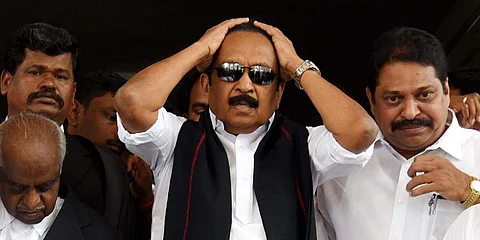

CHENNAI: MDMK general secretary Vaiko on Friday was convicted on charges of sedition and sentenced to undergo one year of simple imprisonment. The case pertains to a speech Vaiko delivered in 2009 in a book release function in Chennai supporting the banned outfit LTTE. He had criticised the State and Central governments for supporting the Sri Lankan government in the war against the Tamil separatist outfit and killing of civilians. The conviction has come at a time when Vaiko is planning to contest the Rajya Sabha polls and it has raised doubts whether this would pose hurdles for him in contesting the election.
The special court judge J Shanthi observed that Vaiko's speech, made in the backdrop of the final stages of the Eelam war, posed a danger to the State and Central governments. "The book was released and the hatred message was delivered on 13.7.2009 just two months (19.5.2009) after the death of LTTE leader Prabakaran. Judging by that standard, at that time there was a danger to the security of the State and Central (governments) and the mood of the people of the State were in a boiling situation," the trial court judge J Shanthi observed in her order.
The court said the IPC section 124A, dealing with sedition, covers acts with intention or tendency to create disorder or disturbance to law and order or incitement to violence. "Whoever tried to excite, attempts to excite is held to come within this section. Whether that act has resulted in violence is immaterial. The accused cannot escape if his act do fall within the ambit of the above explanation with regard to disaffection," the court ruled.
The court sentenced Vaiko for one-year simple imprisonment and a fine of Rs 10,000. The court also suspended the sentence for a month allowing Vaiko to appeal against the verdict. Soon after the judge read out portions of the verdict, the court witnessed a few tensed moments when Vaiko moved angrily towards the podium of the judge and shouted, "Give me maximum punishment. Unless there is venom in the mind of the judge, such a sentence would not have been included in the judgment. I will continue to do it again." Vaiko later told reporters that he was angry because the court had included a sentence mentioning that he had sought lenient punishment.
He said he had never made any such submission before the court. Following this, the court amended its order and struck down that particular point.
Vaiko made the contentious speech on July 15, 2009, when Tamilar Desiya Munnani president Pazha Nedumaran released the Tamil version of Vaiko’s book ‘I accuse’. The book was a compilation letter written by Vaiko to the Prime Minister about the alleged betrayal of Central government by aiding the Sri Lankan government carrying out a genocide in the island nation. In his speech, Vaiko said that children, women and unarmed innocent persons were brutally murdered during the Eelam war criticised then Union government and State government for an alleged failure in preventing the deaths of civilians.
The then DMK government in Tamil Nadu booked Vaiko for the speech on charges of sedition and promoting enmity between various groups. Special Public Prosecutor Rajendran Gayathri argued that Vaiko's speech was against the Indian government and people who heard the message will develop anguish and vengeance against the government. It will also lead to creating law and order problems among the public, submitted the prosecution.
The court's verdict on Friday has raised questions whether Vaiko would not be eligible to contest in the Rajya Sabha polls. Ironically, Vaiko is now contesting the Rajya Sabha polls with the support of DMK.
Former Madras high court judge Justice TN Vallinayagam said the conviction in a sedition case might hurt Vaiko's chances since the only operation of his sentence is stayed, not the conviction. Representation of People's Act disqualifies elected representatives if they are sentenced for two years and above. Vaiko's sentence is only for one year. However, Vallinayagam said since it was a sedition charge, the Election Commission may reject his nomination or even a third party may raise objections. Vallinayagam said the purpose of the Rajya Sabha is to safeguard the country.
However, Justice K Chandru, also a former judge of the Madras High Court, said that his nomination may be upheld as long as he discloses the punishment of a year’s imprisonment. In case of someone who is already a member of the parliament, the disqualification may be instantaneous but in case of Vaiko who is yet to file his nomination, disclosure of the punishment may suffice, he said.
“For a person who is already a member of the parliament and for a person who is yet to enter the parliament, the law slightly differs”, he said.
Section 8 of the Representation of the People Act states that a person convicted of any offence and sentenced to imprisonment for not less than two years shall be disqualified from the date of such conviction and shall continue to be disqualified for a further period of six years since his release. This may also work in favour of Vaiko, who is only sentenced to one year of imprisonment, he said.